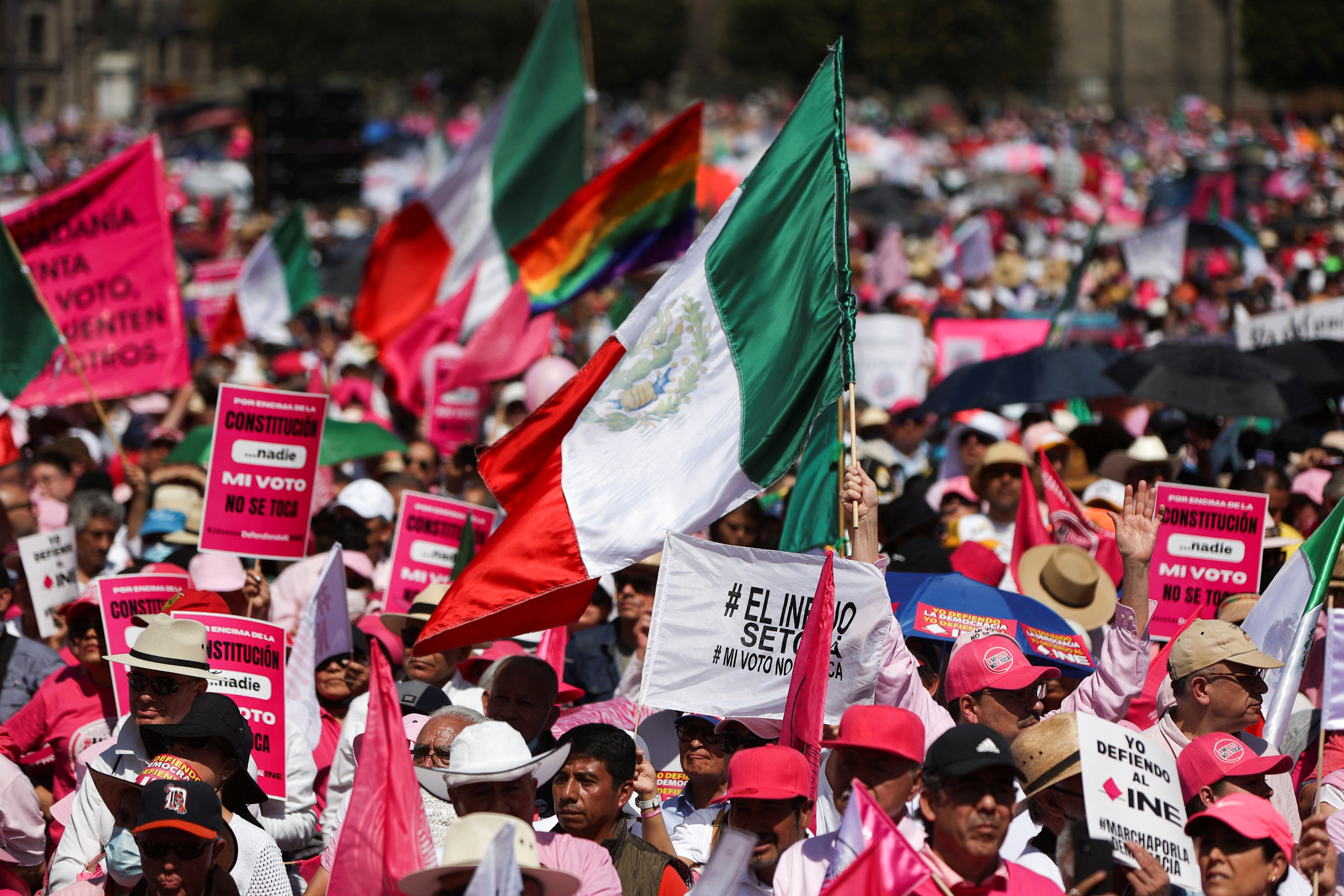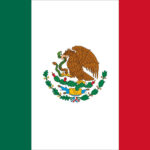The Mexican election of 2024 saw Claudia Sheinbaum of the Morena party secure victory, marking a significant moment for Mexico and its LGBTQ+ community, a win that gaymexico.net closely followed. This outcome is poised to shape the nation’s future, with implications for social progress and LGBTQ+ rights; discover more about the political transition and its impact on LGBTQ+ inclusivity, diversity and safety.
1. What Were The Key Outcomes Of The 2024 Mexican Election?
Claudia Sheinbaum triumphed in the 2024 Mexican presidential election with nearly 60% of the popular vote, outperforming her rivals. Morena, collaborating with the Green Party and Workers’ Party, gained a two-thirds majority in the Chamber of Deputies and narrowly missed a supermajority in the Mexican Congress. The coalition secured seven of nine contested state governorships, granting Morena control over 24 out of 32 governorships. These results give Sheinbaum considerable influence at the federal, state, and municipal levels, fostering better coordination across government levels.
1.1. How Did Morena’s Victory Impact The Political Landscape?
Morena’s overwhelming success presents both opportunities and challenges for Sheinbaum. The first challenge involves managing the diverse and often conflicting interests within Morena, which includes various political opportunists. Another significant factor is the continued influence of outgoing President López Obrador, who may try to exert control over policy decisions. Sheinbaum might also face a recall referendum in three years, a mechanism López Obrador previously used to his advantage.
1.2. What Unique Milestones Were Achieved In This Election?
This election marked a historic moment as both leading presidential candidates were women, highlighting the success of Mexico’s parity laws in promoting female participation in politics. However, this milestone contrasts sharply with ongoing challenges women face in Mexico, such as high rates of femicides, with approximately nine to ten cases reported daily. Sheinbaum has committed to addressing violence against women by strengthening the special prosecutor’s office for femicides, a strategy she implemented during her tenure as mayor of Mexico City.
 Claudia Sheinbaum supporters celebrate her victory in the 2024 Mexican presidential election, reflecting a moment of hope and anticipation for social and political change in Mexico
Claudia Sheinbaum supporters celebrate her victory in the 2024 Mexican presidential election, reflecting a moment of hope and anticipation for social and political change in Mexico
1.3. How Did The “Primaries” Affect Transparency And Party Divisions?
The introduction of “primaries” for selecting top politicians brought much-needed transparency and popular legitimacy to the process. These primaries marked a departure from the traditional closed-door methods used by political parties to select leaders and candidates. However, the absence of formal regulations and the widespread disregard for electoral authorities during these primaries underscored ongoing rule-of-law issues in Mexico. Additionally, the primaries intensified party divisions in an already polarized political environment.
1.4. How Did The Party System Reconfigure After The Elections?
The elections solidified Morena’s dominance in Mexico’s party system, thanks to its redistribution policies and the charisma of López Obrador. Morena successfully attracted both new voters and party operatives, which also benefited the Green Party, elevating it to the second-strongest party in the Chamber of Deputies. In contrast, established parties like the Institutional Revolution Party, the National Action Party, and the Party of the Democratic Revolution (PRD) struggled, losing key governorships and facing the risk of losing party registration.
2. How Did Organized Crime Influence The 2024 Mexican Election?
Organized crime significantly impacted the 2024 elections, marking a grim milestone in Mexico’s political history. The electoral cycle saw a record number of attacks against politicians, with 320 documented incidents, including 93 murders and 37 candidates killed. States with high levels of organized crime violence, such as Chiapas, Guerrero, Jalisco, and Michoacán, reported the most election-related violence. Criminal groups employed assassinations and bribery to influence the elections, promoting preferred candidates, intimidating rivals, and dictating voting choices.
2.1. What Role Did Criminal Groups Play In The Election Process?
Criminal groups have evolved from merely carrying out the violent orders of politicians to actively shaping the electoral landscape. They bribe politicians at the national level, intimidate local officials, and now select and promote their preferred candidates. They also dictate governance terms to elected officials, influencing decisions ranging from impunity to the regulation of legal economies. This unprecedented level of involvement poses a severe threat to Mexico’s democratic institutions.
2.2. How Has López Obrador’s Approach To Security Affected The Situation?
López Obrador’s approach of avoiding direct confrontation with criminal groups, hoping they would redistribute territories and reduce violence, has proven disastrous. Instead, criminal groups have expanded their control over territories, people, legal economies, and institutions, exacerbating the security crisis in Mexico. This hands-off approach has allowed criminal organizations to operate with increasing impunity.
 A depiction of election-related violence in Mexico, where organized crime groups exert influence through intimidation and violence against candidates and voters
A depiction of election-related violence in Mexico, where organized crime groups exert influence through intimidation and violence against candidates and voters
3. What Mandate Does Sheinbaum Have And What Power Does López Obrador Hold?
Sheinbaum plans to continue López Obrador’s “Fourth Transformation,” which includes expanding the power of the Mexican presidency and increasing the military’s role in public policy. However, this approach has also led to a weakening of democracy, with attacks on independent institutions, non-governmental organizations, and freedom of expression. López Obrador has used an anti-corruption agenda to target political rivals but has not applied it consistently, particularly concerning his allies and family.
3.1. How Can López Obrador Use His Remaining Time In Office?
López Obrador has a significant opportunity in his last months to push through major changes, including 20 proposed reforms. These reforms, many requiring constitutional changes, span various issues, from healthcare and pension reform to institutional design. Contentious points include eliminating proportional representation in Congress, restructuring regulatory agencies, transferring control of the National Guard to the military, and popular election of Supreme Court justices. These reforms threaten to dismantle checks and balances further.
3.2. What Challenges And Opportunities Does Sheinbaum Face Before Taking Office?
Sheinbaum’s defining moment as a leader may come before she even assumes office. She will need to manage her relationship with López Obrador to carve out space for her policy agenda and prevent further democratic backsliding. López Obrador has expressed a willingness to consult with Sheinbaum on implementing the reforms, offering a potential avenue for her to influence the direction of these changes.
4. What Are The Implications For The LGBTQ+ Community In Mexico Following The Election?
The election of Claudia Sheinbaum presents both hope and uncertainty for the LGBTQ+ community in Mexico. On one hand, her progressive stance and commitment to social justice suggest potential advancements in LGBTQ+ rights and protections. On the other hand, the influence of López Obrador’s policies and the ongoing challenges of violence and discrimination remain significant concerns.
4.1. Potential Advancements In LGBTQ+ Rights And Protections
Claudia Sheinbaum has a track record of supporting progressive policies, which could translate into advancements for LGBTQ+ rights. Potential areas of progress include:
- Marriage Equality: Further expansion and protection of same-sex marriage rights across all Mexican states.
- Adoption Rights: Ensuring equal adoption rights for LGBTQ+ couples.
- Anti-Discrimination Laws: Strengthening and enforcing laws that protect LGBTQ+ individuals from discrimination in employment, housing, and services.
- Gender Identity Recognition: Streamlining the process for legal gender recognition for transgender and gender non-conforming individuals.
4.2. Concerns Regarding López Obrador’s Policies And Influence
While Sheinbaum’s election is a positive sign, concerns remain due to the influence of López Obrador’s policies. His focus on social issues has sometimes overshadowed LGBTQ+ rights, and his conservative social views could indirectly hinder progress. Key concerns include:
- Budget Allocations: Ensuring that LGBTQ+ programs receive adequate funding despite other competing social priorities.
- Political Will: Maintaining the political will to prioritize LGBTQ+ issues in the face of potential resistance from conservative factions within Morena.
- Implementation Challenges: Overcoming bureaucratic and logistical challenges in implementing LGBTQ+-inclusive policies at the state and local levels.
4.3. Ongoing Challenges Of Violence And Discrimination
Despite legal advancements, violence and discrimination against LGBTQ+ individuals remain pervasive in Mexico. According to Human Rights Watch, LGBTQ+ Mexicans often face significant challenges:
- Hate Crimes: Addressing the high incidence of hate crimes and violence against LGBTQ+ individuals, particularly transgender women.
- Discrimination: Combating discrimination in employment, healthcare, and education.
- Lack of Enforcement: Ensuring that existing anti-discrimination laws are effectively enforced and that perpetrators of violence are brought to justice.
4.4. LGBTQ+ Community’s Expectations And Hopes
The LGBTQ+ community in Mexico has high expectations for Sheinbaum’s administration. They hope for concrete actions that will improve their daily lives and ensure their safety and well-being. Key expectations include:
- Inclusive Policies: Implementing policies that specifically address the needs and concerns of LGBTQ+ individuals.
- Representation: Ensuring LGBTQ+ representation in government and decision-making bodies.
- Dialogue: Establishing open and ongoing dialogue between the government and LGBTQ+ organizations to address emerging issues and develop effective solutions.
5. What Travel Advice And Safety Tips Can LGBTQ+ Visitors Find On Gaymexico.Net?
Gaymexico.net offers a wealth of information and resources for LGBTQ+ travelers planning a trip to Mexico. The site provides detailed travel guides, safety tips, and insights into LGBTQ+-friendly destinations, ensuring visitors have a safe and enjoyable experience.
5.1. Detailed Travel Guides For LGBTQ+-Friendly Destinations
Gaymexico.net offers comprehensive travel guides to the most welcoming cities and regions in Mexico. These guides highlight the unique attractions, local culture, and LGBTQ+ scene in each destination. Popular destinations include:
- Puerto Vallarta: Known as one of the most LGBTQ+-friendly cities in the world, offering numerous gay bars, clubs, and beaches.
- Mexico City: A vibrant metropolis with a thriving LGBTQ+ community, featuring cultural events, historical sites, and diverse nightlife.
- Cancun: A popular tourist destination with an increasing number of LGBTQ+-friendly resorts and activities.
- Guadalajara: A city with a rich cultural heritage and a growing LGBTQ+ scene, offering a mix of traditional and modern attractions.
These guides provide valuable information on where to stay, what to do, and how to navigate the local culture with confidence.
5.2. Insights Into Local LGBTQ+ Culture And Scene
Understanding the local LGBTQ+ culture is essential for a fulfilling travel experience. Gaymexico.net offers insights into the cultural nuances and social dynamics of the LGBTQ+ community in Mexico. Key aspects include:
- Community Events: Information on local pride parades, festivals, and cultural events.
- Social Norms: Tips on local customs and etiquette to ensure respectful interactions.
- Support Networks: Resources for connecting with local LGBTQ+ organizations and community groups.
This knowledge helps travelers engage with the local community authentically and respectfully.
5.3. Up-To-Date Safety Information And Advice
Safety is a top priority for LGBTQ+ travelers. Gaymexico.net provides current safety information and advice to help visitors stay safe and avoid potential risks. Key tips include:
- Awareness: Being aware of your surroundings and avoiding potentially dangerous areas.
- Discretion: Exercising discretion in public displays of affection, depending on the location.
- Local Laws: Familiarizing yourself with local laws and regulations related to LGBTQ+ rights.
- Emergency Contacts: Keeping a list of emergency contacts, including local police and LGBTQ+ support organizations.
This information empowers travelers to make informed decisions and stay safe throughout their trip.
5.4. How To Find And Connect With Local LGBTQ+ Communities
Connecting with local LGBTQ+ communities can enhance the travel experience and provide a sense of belonging. Gaymexico.net offers resources for finding and connecting with local groups and organizations. Options include:
- Online Forums: Participating in online forums and social media groups to connect with local LGBTQ+ individuals.
- Community Centers: Visiting local LGBTQ+ community centers to learn about events and resources.
- Volunteer Opportunities: Engaging in volunteer opportunities to support local LGBTQ+ causes and meet like-minded people.
These connections provide opportunities for cultural exchange and personal enrichment.
5.5. Resources For Reporting Incidents Of Discrimination Or Violence
In the unfortunate event of experiencing discrimination or violence, it’s essential to know how to report the incident and seek support. Gaymexico.net provides resources and information on reporting mechanisms. Resources include:
- Local Authorities: Contact information for local police and government agencies.
- LGBTQ+ Organizations: Details of LGBTQ+ organizations that provide legal and emotional support.
- Human Rights Groups: Information on international human rights groups that advocate for LGBTQ+ rights.
This ensures that travelers have access to the support and assistance they need in challenging situations.
6. What Are The 5 Search Intentions Behind “Who Won The Mexican Election 2024”?
Understanding the search intentions behind “Who Won The Mexican Election 2024” helps tailor content to meet users’ needs effectively. Here are five key search intentions:
- Information Seeking: Users want to know the election results and identify the winner. They seek factual, up-to-date information on the outcome of the election.
- Political Context: Users aim to understand the political implications of the election results. They want insights into how the winner’s policies and agenda will affect the country.
- Impact Analysis: Users are interested in the broader impact of the election on various sectors, such as the economy, social policies, and international relations. They look for analysis from experts and news sources.
- Biographical Information: Users want to learn more about the winner, including their background, political experience, and policy positions. They seek detailed profiles and biographies.
- Future Predictions: Users are curious about what the future holds under the new leadership. They want predictions and forecasts from political analysts and commentators.
7. What Are Some Important FAQs About The 2024 Mexican Election?
7.1. Who Was The Winner Of The 2024 Mexican Presidential Election?
Claudia Sheinbaum of the Morena party won the 2024 Mexican presidential election. She secured nearly 60% of the popular vote, marking a historic victory for Mexico.
7.2. What Were The Main Issues In The 2024 Mexican Election?
The main issues included security, corruption, economic inequality, and social policies. Candidates also focused on healthcare, education, and environmental concerns.
7.3. How Did Organized Crime Affect The 2024 Mexican Elections?
Organized crime played a significant role through violence and intimidation, with numerous attacks against politicians and candidates. This created an atmosphere of fear and influenced the electoral process in several regions.
7.4. What Are The Potential Implications Of Sheinbaum’s Victory For The LGBTQ+ Community In Mexico?
Sheinbaum’s progressive stance offers hope for advancements in LGBTQ+ rights and protections, including marriage equality, adoption rights, and anti-discrimination laws. However, challenges remain due to ongoing violence and social conservatism.
7.5. How Will The New Government Address Violence Against Women?
Sheinbaum has promised to empower a special prosecutor for femicides, as she did during her tenure as mayor of Mexico City, to tackle violence against women. This involves strengthening law enforcement and providing resources for victims.
7.6. What Role Will López Obrador Play After The Election?
López Obrador may continue to exert influence over policy decisions and could potentially use the recall referendum process to influence Sheinbaum’s agenda. This dynamic will be crucial in shaping the direction of the new administration.
7.7. How Did The “Primaries” Impact The Election Process?
The “primaries” brought much-needed transparency to the selection of top politicians but also exacerbated party divisions due to the absence of formal regulations and disregard for electoral authorities.
7.8. What Were The Key Policies Proposed By Claudia Sheinbaum?
Sheinbaum’s key policies include continuing López Obrador’s “Fourth Transformation,” focusing on social programs, and addressing issues such as climate change, healthcare, and education.
7.9. How Can LGBTQ+ Travelers Stay Safe In Mexico?
LGBTQ+ travelers can stay safe by being aware of their surroundings, exercising discretion in public displays of affection, familiarizing themselves with local laws, and connecting with local LGBTQ+ communities for support and information, all of which can be found on gaymexico.net.
7.10. Where Can I Find More Information About LGBTQ+ Travel In Mexico?
More information about LGBTQ+ travel in Mexico can be found on gaymexico.net, which offers detailed travel guides, safety tips, and resources for connecting with local LGBTQ+ communities.
8. Conclusion: Navigating Mexico’s Future with Hope and Information
The 2024 Mexican election marks a pivotal moment, and understanding its outcomes is crucial for everyone, especially the LGBTQ+ community. With Claudia Sheinbaum’s victory, there’s potential for progress, but challenges remain. For LGBTQ+ individuals planning to visit or connect with Mexico, gaymexico.net offers essential resources and information. Explore detailed travel guides, safety tips, and community insights to ensure a safe and enriching experience. Stay informed, stay connected, and be part of the journey toward a more inclusive Mexico.
Ready to explore Mexico? Visit gaymexico.net today for travel guides, event listings, and community connections, or visit us at 3255 Wilshire Blvd, Los Angeles, CA 90010, United States, or call +1 (213) 380-2177.
